Like most of the Coen brothers’ films, ‘No Country For Old Men’ (2007) is quirky and brilliant. It is slow-moving, character-driven masterpiece about nuanced but weird characters. It is indeed very violent and bloody and not always for the squeamish. It is a film that is very different from the harmless fun that ‘The Big Lebowski’ (1998) and ‘O Brother Where Art Thou’ (2000) is. This is a tough, gritty story that takes time to build and is gripping with every passing moment. This is a thriller with its superbly crafted script and Roger Deakins’ lavish cinematography. Based on Cormac McCarthy’s novel of the same name, ‘No Country For Old Men’ is a film that is difficult to forget once you have watched it. And that’s because you can’t help but keep thinking about its mythical characters and unexpected ending. So, let’s take a deep dive into the film that try to understand what are its underlying themes, and what does its ending mean.
The Plot
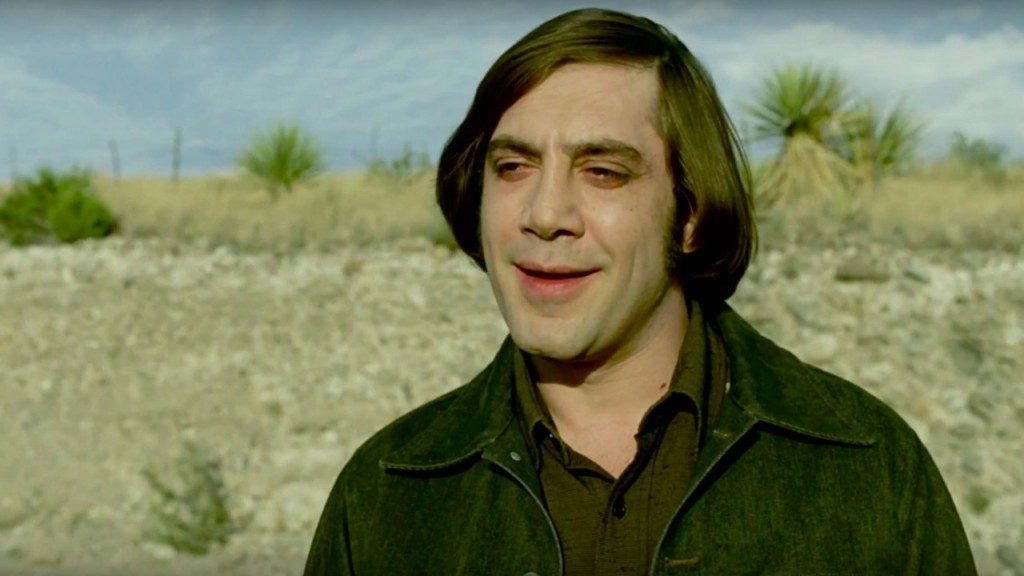
The movie takes us into Texas 1980 where a hitman Anton Chigurh (Javier Bardem) after being arrested by a deputy sheriff manages to strangle him so as to escape along with captive bolt pistol, his premier weapon of choice. It looks like an oxygen attack, but it’s actually used for killing cattle in a slaughtering house. He escapes in a stolen police squad car but stops a random motorist along the way and politely asks him to step out of the car and kills him with his pistol by firing the bolt into the motorist’s skull. Chigurh drives off in the motorist’s car.
In the next scene, we’re introduced to Llewelyn Moss (Josh Brolin) who while hunting pronghorns, comes across the aftermath of a drug deal gone bad. He notices several dead men and dogs, a wounded Mexican begging for water and finds two million dollars in a briefcase and a .45 calibre pistol. He takes both the money and the gun. That night, Moss filled with guilt over not providing any water for that wounded Mexican decides to go back there to help the wounded man but notices that a shotgun had killed him. Suddenly, he discovers that he’s being pursued by two men in a truck and after a brief encounter of firing and running, Moss somehow manages to escape by diving into a nearby river and to swim ahead, away from harm’s sight. Realizing that he’s now been involved with some dangerous individuals, he returns home and sends his wife Carla Jean to stay with her mother while he decides to drive to Del Rio with the money and remains in a motel so as to hide the money in a safe place by hiding it in the room’s air-conditioning duct.
The Coin Toss Scene
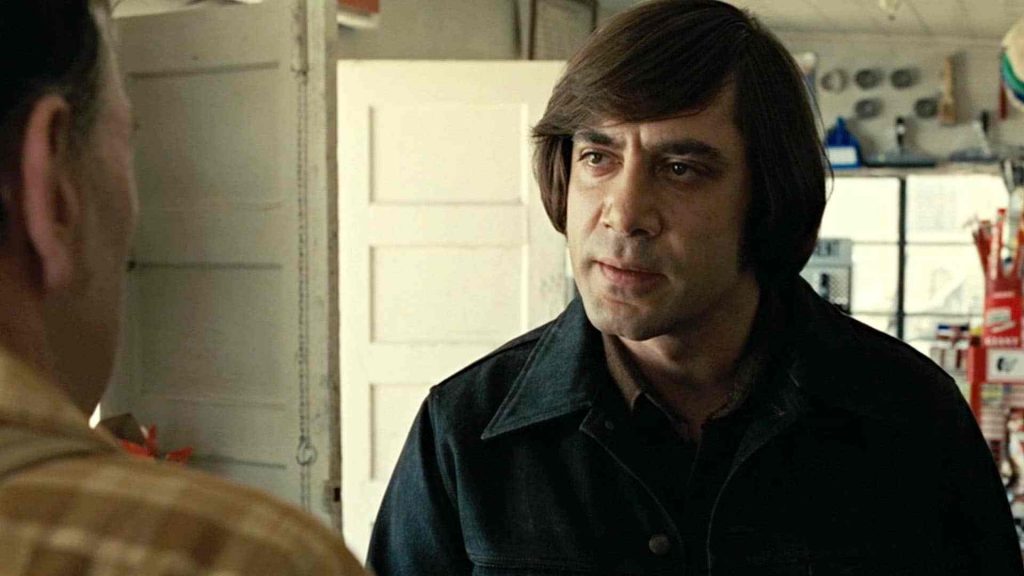
One of the most chilling scenes in the movie, the next scene, takes us back to Chigurh where after filling at a gas station, Cihugurh goes to pay for the candy and the gas from the gas proprietor. While the proprietor tries to initiate a polite conversation by asking seemingly innocent questions, Chigurh gets rather irritated by the proprietor’s silly small talk, and then, the proprietor finds himself in a tense and strange confrontation. He is genuinely perplexed and tries to diffuse the argument by saying he needs to close the station, which only further irritates Chigurh as it’s still midday. Chigurh then tells him to call on the flip of the coin so as to decide whether the proprietor stands to win everything without telling him what he is calling for. After some tense moments, he guesses heads and Chigurh gives the man the coin. He tells him not to mix it with the other coins in his pocket as it brings bad luck. Chigurh then just walks away.
This entire scene’s duration is like four minutes and is over seven pages long (as mentioned in the script). There’s no action; nobody gets killed in this scene so how come this entire sequence is so chilling? As we’re taken into the conversation, Chigurh gets annoyed with the fact that the shop owner repeatedly doesn’t seem to understand his questions. After all, he is innocent; how could he follow Chigurh’s line of provocative questions as he has no idea that Chigurh comes from a world of the threat of looming violence? Chigurh remarks that the proprietor “married” into his business (by occupying the store and the house once owned by his father-in-law by marrying his daughter). Chigurh remarks that he doesn’t have any other way to put it and that’s the way it is. He then says, “What’s the most you’ve ever lost on a coin toss?”
This brings us to the question: Why is it so damn important to Chigurh that he determines to put the poor guys’s life at risk over a coin toss? Just because the old guy benefited from something not directly related to his hard work? Marrying his wife is somehow a dishonest way of getting ahead? These questions are left unresolved as Chigurh has determined that the coin he’s tossed now is a twenty-two-year-old journey to “get here” and that its destiny is now tied up with the Proprietor’s fate, such that Chigurh is calling it to execute whatever the coin determines justice. And all of that plays into the tense moments of the coin toss and its resolution. Or you could just put it in another way that Chigurh simply tried to rattle up the shop owner by distracting him so that he avoids paying for the gas! (Mind you, which he doesn’t!)
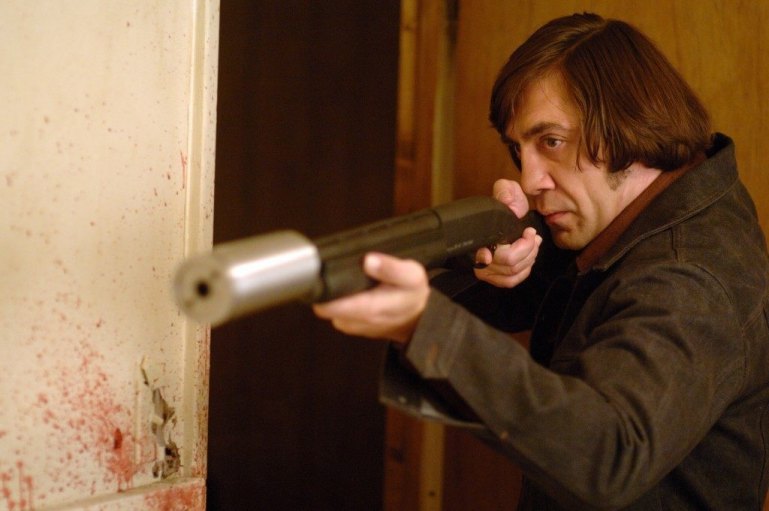
Chigurh is hired to track the stolen money and recover it. He then arrives at Moss’ home to search for the money but finds it empty. Meanwhile, Sheriff Bell (Tommy Lee Jones) investigates the abandoned burning police car and follows its tracks leading to the shootout site where Bell recognises Moss’s truck. Back in the motel at Del Rio, Moss rents another room at the motel such that both the two rented rooms share the same air-conditioning duct (where the money is kept). He does this as he knows that he is in imminent danger due to the stolen money. We then find out that Chigurh attempts to pursue where Moss is headed. He somehow manages to find the location of the hidden money with the help of a tracking device’s signal and a tracker which had earlier been put with the money. Chigurh breaks into the first room where he finds three Mexicans (who are waiting to ambush Moss) and kills them without batting an eye. The gunfire alerts Moss who retrieves the briefcase from the duct and escapes before Chigurh finds him.
Moss then moves to a border town where he rents a room in an old rundown hotel. Worried as to how Chigurh found him, he discovers the tracker in the briefcase before Chigurh ambushes him. A gunfight ensues where both of them end up severely wounding the other before Moss manages to flee to Mexico, stashing the briefcase in the weeds along the river Rio Grande. Moss is taken to a hospital by a passing band whereas Chigurh blows a car so as to use it as a diversion to buy stolen medicine supplies which he then treats his wounds himself in a hotel. Meanwhile, Carson Wells (Woody Harrelson) another hired operative fails to persuade Moss in the hospital by assuring him protection in return for the money. Later, Chigurh manages to sneak up behind Wells in a hotel and follows him to his room. Carson tries to strike a deal with Chigurh who before the phone rings, kills him. The phone call is from Moss. In a tense phone call, Chigurh promises that he won’t kill Moss’ wife Carla Jean if Moss hands over the money. He then sardonically threatens Moss that his life won’t be spared and although he won’t drive up to the hospital to kill him (as he knows of Moss’s location), he’ll go instead to Moss’ mother-in-law’s house to kill her.
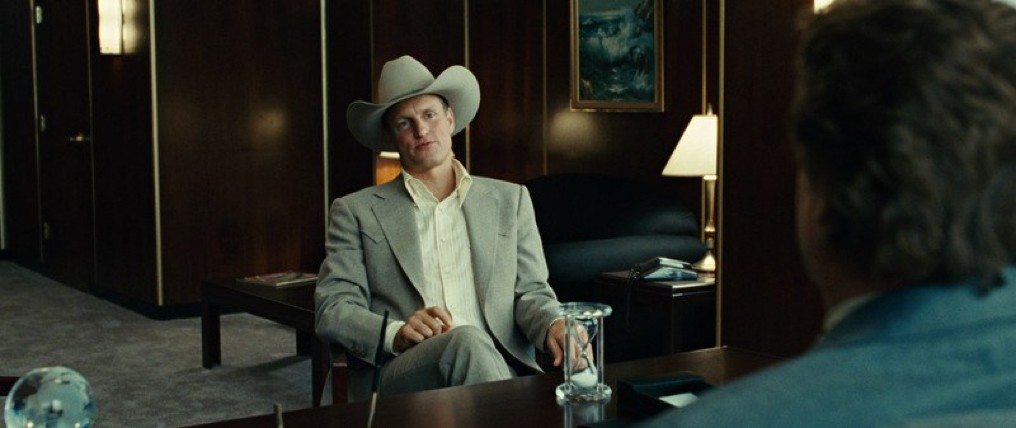
After retrieving the briefcase from the banks of Rio Grande, Moss then arranges to meet Carla Jean at a motel at El Paso, where he plans to give her the money and hide her from danger. She is then visited by Sheriff Bell who promises to protect her husband. The Mexicans who have been following Carla Jean and her mother learn from her mother (quite unwittingly) about Moss’ whereabouts. Sheriff Bell is driving up to the motel in El Paso when he hears some gunshots and notices a pickup truck speeding from the scene of the crime. Bell then arrives at the parking lot where he sees Moss lying dead. When Carla Jean arrives, she chokes up on finding out that her husband is dead. That same night, Bell arrives at the crime scene and finds the lock of the room blown out (a habit of Chigurh where he fires the lock with his pistol as we’ve seen him do a countless number of times in the film). Bell is unaware that Chigurh is hiding right behind that door after retrieving the money. Later, Bell visits his uncle Ellis to confide that he plans to retire as there is too much violence in the town and that Bell feels a bit too “over-matched”.
Some weeks later, Carla Jean returns from her mother’s funeral only to find Chigurh waiting in her bedroom. She knows why he’s there but still finds it meaningless. Chigurh proceeds to flip a coin, but Carla Jean refuses to play his game by dismissing it and saying that the choice is up to Chigurh whether he wants to kill her or not. He is unmoved. However, insisting on his lack of a free choice in the matter. Chigurh then leaves the house (we presume that he killed Carla Jean) and as he drives away from the neighbourhood, he crashes into a car at the intersection, leaving him injured. He notices that two young boys have witnessed the entire accident and bribes them for their silence and one of their shirts, which he uses to make a sling for his arm before he limps away down the street.
The Ending
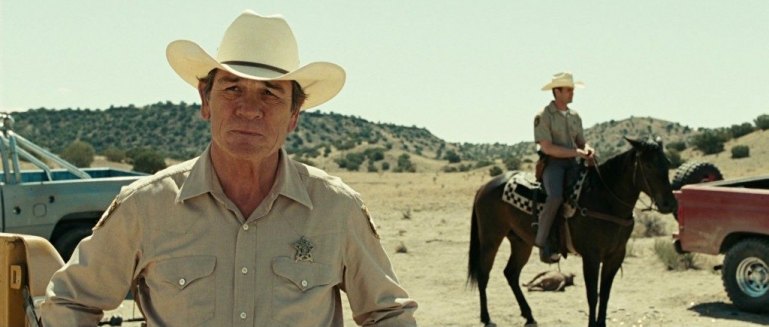
We’re then taken to the last scene at Sheriff Bell’s house, where he has officially retired and ponders what to do for the day over breakfast with his wife. He recounts two dreams with his wife: in the first one, where he lost some money that his father had given to him and in the second one, he and his father were riding through a snowy mountain pass at night. His father rode ahead into darkness and disappeared but Bell presumes that his father kept riding forward and expected Bell to make a warm fire.
So what’s up with that ambiguous ending?
The majority of the movie focuses on Moss escaping from Chigurh so does it make sense for a story to leave the audience with a seemingly peripheral character’s enigmatic breakfast conversation? Yes, because that final scene gives us some clarity into the movie’s deeper meaning and the Coens’ pessimistic worldview. Bell is one of the “Old Men”, and we do indeed get a glimpse into why there’s “no country” for them anymore. Bell is entirely lost as he struggles to face the actual world of chaos and randomness. The Coens cleverly make use of the dreams to show Bell mourning the decent, lawful world he believes in, which probably has never existed but has been an illusion i.e., a dream all along. Yes, the ending is quite pessimistic and opaque.
On the one hand, Moss’ end tells us that our past sins catch up with us. On the other hand, there is no justice in the story as Chigurh escapes as if one of his coin tosses had determined his outcome. We’re left with a frightening interplay of the arbitrary and the inevitable in which we must fear both moral punishment and the total disregard for moral order.
Regarding Bell’s dreams, he’s quite reluctant to share with his wife thinking that she will find it quite boring. The choice to end with some unambiguous dreams is hardly dramatic and that the viewers might find it quite boring but that’s how the Coens decided to end the story. Bell says that he’s now twenty years older than his father was in the second dream. Something’s off and that time has been inverted because Bell is now older than his father such that he is now the “old man”. This means that Bell represents a character displaced from an era in the Western where the old ideas of law enforcement or casualties no longer seem to apply. The world has become too dangerous for Bell and he retires because he feels defeated by this new world. Whereas the first dream talks about him being given some money by his father which symbolizes what the majority of the film is all about – the struggle between Moss and Chigurh to get a briefcase of two million dollars.
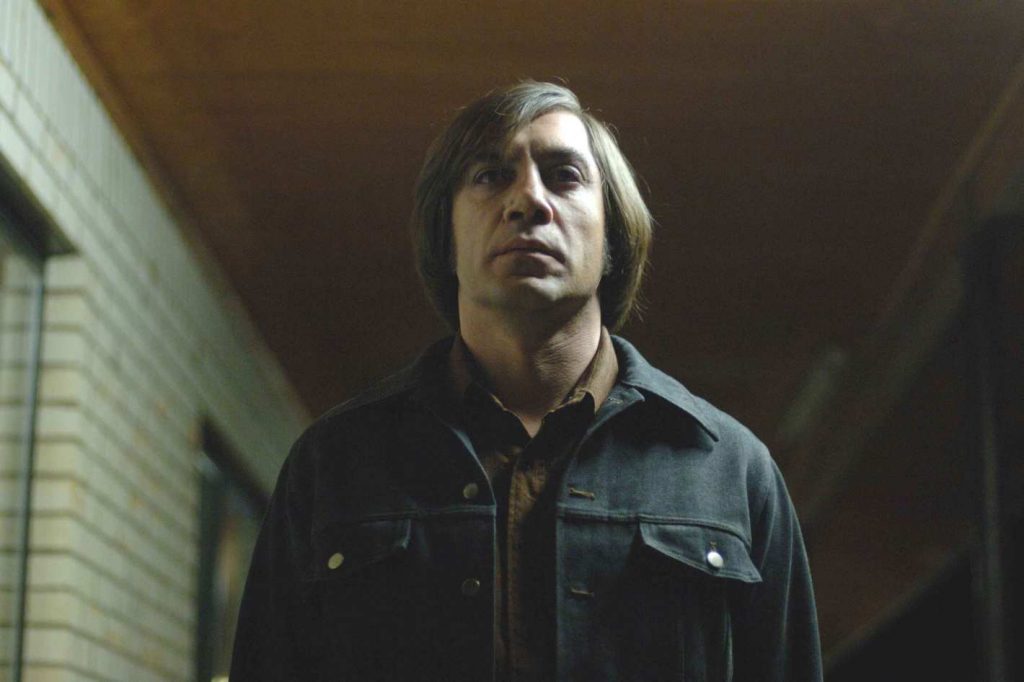
All of the characters who are concerned with the money end up either dead or injured and morally empty. So the first dream leaves us with the sense that greed eventually leads people to their downfall and that those who aren’t that greedy end up living a safer and fuller life like Bell. But the money in that dream also tends to symbolize success or just good fortune. Bell loses the money which evokes his loss of this world which baffles him and seems to have no use for him anymore. He has another chance to understand the recent events but his losing the money also symbolizes his inability to see his world clearly. He’s so out of touch not just because the world has moved on but also it was never what he imagined it to be.
Sheriff Bell’s monologue right at the beginning of the film talks about older times when sheriffs didn’t even carry guns. This means that Bell is filled with the nostalgia for a safer, straightforward time where every crime makes sense and that all the criminals were put behind bars.
This movie can be called a Neo-Western which reaches a very different conclusion and worldview. Yes, it has a hinterland setting with heroes and villains, guns, drugs, a money chase and some western hats, all of which make a classic Western movie. But this movie is not your typical Western as the hero doesn’t win or even survive, the villain gets away, and the ending doesn’t have a classical Mexican standoff but rather a slow, calm monologue by a character who was the least involved of the three main characters. Bell assumes Moss to be the good guy as he’s pitted against the psychopath Chigurh but is Moss really the hero in this movie? Yes, the viewers are made to side with him in his battle with Chigurh but Moss is far from being the hero, he’s a thief. He stole some money which never even belonged to him in the first place and in doing so, jeopardized both his wife and mother-in-law’s lives.
The remorseless villain – Anton Chigurh is likewise the least straightforward than the bad guys of the old. With his coin toss game of death, he’s intentionally modelled himself as a force of random destruction. His actions stem from a worldview that has logical integrity, whether or not it represents the truth. As the carrier of this coin, he believes in reminding people that their lives are ultimately subject to forces that are just out of our control.
Final word
The underlying message of the film is that there is no symmetry to life. What goes around really does not come around. The fall of the coin has no bearing on the way the cookie crumbles. There is no right or wrong to the fates of men. No justice. Opportunities seized may lead on to fortune but they could just as well lead on to a miserable death. Only the children expect things to be fair. In the end, Sheriff Bell’s dreams show that not all our problems can be solved by our inner selves – sometimes the consciousness tells you what we truly want but it’s a wish that’s almost impossible to fulfill.
Read More in Explainers: The Shining | The Witch

You must be logged in to post a comment.